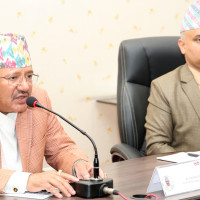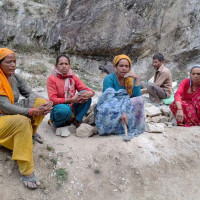- Tuesday, 17 February 2026
People At Centre of Nepal-China Ties
In 2025, Nepal and China celebrate the platinum anniversary of their modern diplomatic ties. Coinciding with this milestone is the 25th anniversary of China Study Centre Nepal (CSC), whose first General Assembly was held on August 1, 1999, under the leadership of Madan Regmi. Registered in May 1999, CSC emerged through the collaboration of autonomous Nepali and Chinese intellectuals seeking an operational platform beyond ceremonial forums.
At its core, CSC recognised the One-China principle and China’s role in strengthening national sovereignty. The organisation’s name and focus acknowledged the growing global relevance of China and Nepal’s geographical imperative to engage with it meaningfully. The Centre's vision was to foster deeper Nepal-China ties at the levels of policy, people, senior officials, and think tanks, while remaining non-partisan and rooted in intellectual engagement rather than mass mobilisation and activism.
Challenges
A foundational meeting in January 1999 brought together an interdisciplinary group of thirteen professionals — academics, diplomats, authors, and engineers — who laid the groundwork for CSC. General Assembly meetings were held every three years to elect the Executive Committee by consensus. The early years were marked by allegations from Indian media and some politicians, who accused CSC of being a front for Chinese interests. Claims of Chinese funding and diplomatic involvement stirred controversy. China supported CSC’s translation, printing, publication dissemination, and certain seminar costs. India’s Rajiv Gandhi Foundation received substantial contributions from China during the same period.
Despite the scepticism, CSC’s engagements — through policy talks, senior official interactions, think tank-level exchanges, and efforts to strengthen people-to-people understanding and cooperation through the dissemination of accurate information on China — continued. These engagements contributed to a mature and transparent discourse on Nepal-China relations at all levels.
The first 15 years marked a constructive era of mutual communication and understanding. Successive Nepali Prime Ministers — late Krishna Prasad Bhattarai, late Girija Prasad Koirala, Sher Bahadur Deuba, late Sushil Koirala, Madhav Kumar Nepal, Jhalanath Khanal, K.P. Sharma Oli, and Pushpa Kamal Dahal Prachanda — welcomed Chinese academic delegations from CSC’s counterparts, including China Association of International Friendly Contact (CAIFC) and China Institutes of Contemporary International Relations (CICIR). CSC signed MoUs with both organisations in 1999 and 2007, respectively.
Leaders expressed themselves to the visiting Chinese delegations in their respective postures and styles. K.P. Bhattarai impressed with wit and insight; Girija Koirala was candid and courteous; Deuba was selectively open and welcoming; Sushil Koirala was open yet careful. Other PMs like Madhav Nepal demonstrated an element of political pedagogy; Khanal displayed a selective risk-taking sense; and Oli articulated regional development aspirations, especially concerning infrastructure and connectivity. Prachanda and Dr. Baburam Bhattarai were ideological on political issues. Communication continued even when these leaders were out of office, reflecting deep-rooted political acknowledgment of Nepal-China ties.
CSC also engaged the wider public through well-thought-out publications, many in Nepali, which introduced China’s history, governance, society, bilateral, and international relations. These included titles such as Political History of China, Social History and Transformation of Tibet, China Through Latticed Window, and Xi Jinping: The Governance of China.
CSC maintained valuable communication with senior Chinese officials. During Wang Yi’s term as Vice Foreign Minister (2001–2004), a breakthrough occurred in China-India relations: India explicitly recognised Tibet as part of China, while China steadily moved toward considering Sikkim as part of India. In a courtesy meeting, CSC members shared their nuanced view that Sikkim’s altered status carried long-term socio-political implications for Nepal, highlighting the complexities left by colonial legacies.
CSC also held engagements with Ai Ping, Vice Foreign Minister of the International Department of the Central Committee of the Communist Party of China (CPC). He encouraged Nepal-China-India hydropower cooperation, particularly when Gujarat (after Narendra Modi’s chief ministership), Bihar (under Chief Minister Nitish Kumar), and China's interests converged in harnessing Nepal’s hydropower potential as a model for regional development cooperation. Ai Ping’s outreach extended even to Madhesi parties in Nepal.
In 2006, China’s State Councillor Tang Jiaxuan visited Nepal and met King Gyanendra and opposition leader Girija Prasad Koirala, emphasising reconciliation among Nepal’s political forces. Later visits by CPC International Department Minister Wang Jiarui (2007) and Vice Foreign Minister He Yafei (2008) included public policy talks supported by CSC.
CSC’s think tank partnerships, especially with CAIFC and CICIR, provided platforms for regular bilateral exchanges. Institutional links were built on a need basis with research bodies such as Fudan University, the Xizang-Tibet Academy of Social Sciences (XASS), and the Shanghai Institutes of International Studies. In June 2025, CSC supported an XASS field study of the planned China-Nepal Friendly Industrial Park in Damak, a project included in the schedule of the BRI Cooperation Framework signed in late 2024.
In the post-illness period of Regmi, internal operations suffered due to organisational gaps. CSC’s website has remained inactive since 2015. Despite being viewed by some foreign actors as ideologically oriented, CSC stood firm on independence and mutual respect. When asked to align with external “democratic values,” the reply was clear: respect for each other’s chosen organisational path is true inner democracy.
Financial credibility
A South Korean diplomat once noted in a meeting that investment interest depends not just on willingness but on financial credibility—something Nepal achieved only in late 2024 with a BB– credit rating from Fitch, the second highest in South Asia after India (Source: Cherie Media, “Nepal Achieves First Sovereign Credit Rating,” November 29, 2024).
This underscored that Nepal’s engagement with China must continue to be grounded in strategic planning, credibility, and independent judgment. CSC’s 25-year journey reflects an earnest effort to bridge Nepal and China through informed, knowledgeable, policy-driven, and people-oriented regular communication—an effort that must adapt to changing times while staying rooted in principled cooperation.
(Dr. Gautam is the founding member and secretary general of the China Study Centre Nepal)














